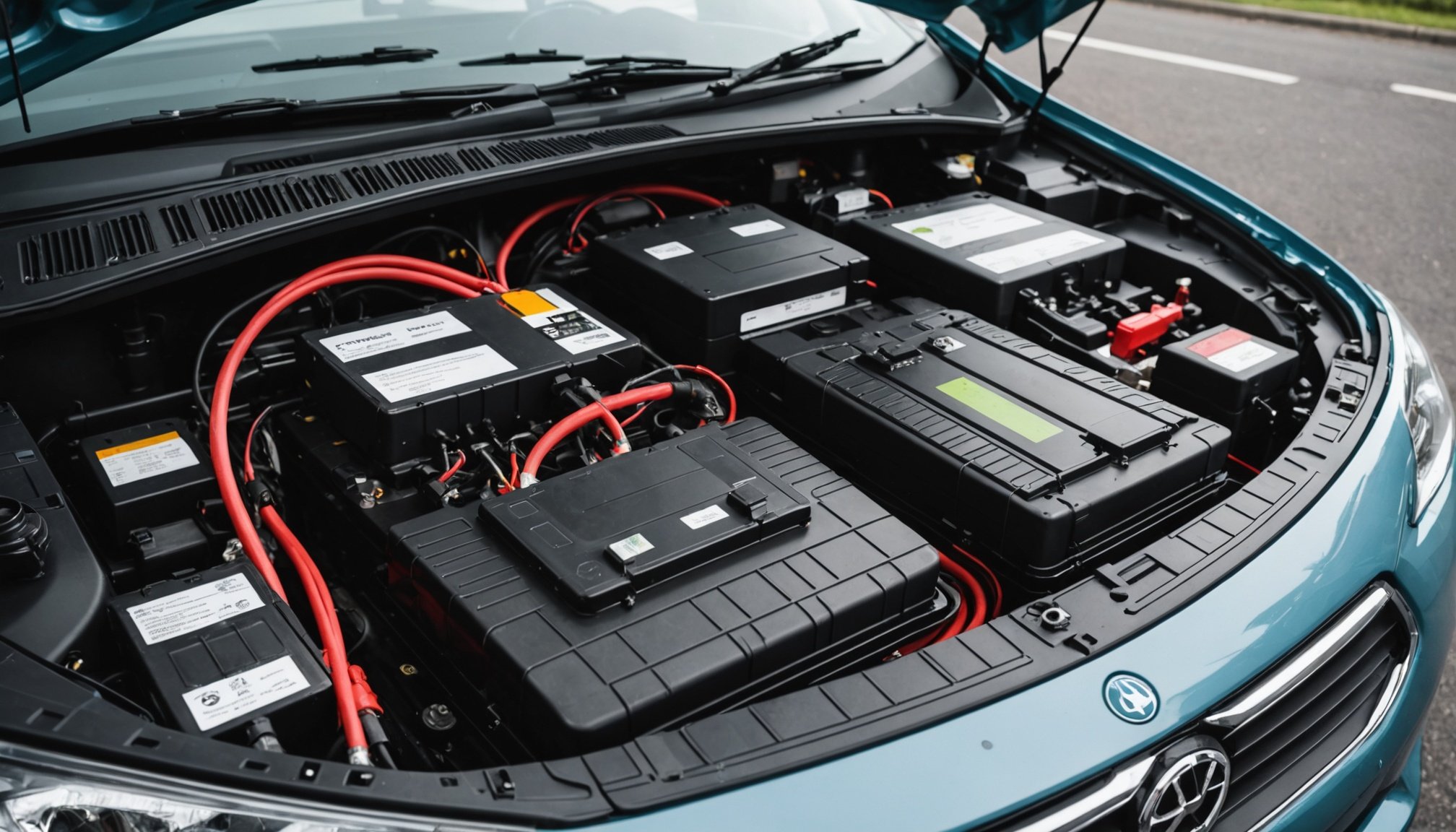Understanding Hybrid Car Batteries
Hybrid car batteries are crucial components that affect both performance and the overall lifespan of hybrid vehicles. Hybrid battery technology differs significantly from conventional batteries. Unlike traditional car batteries that generally store energy for a short period, hybrid batteries work continuously to assist in fuel efficiency and the vehicle’s electric motor operations, providing both power assistance and the ability to charge via regenerative braking.
In the UK, the average lifespan of a hybrid battery is generally between 5 to 10 years, depending on usage patterns, maintenance diligence, and environmental factors. Regular maintenance and cautious driving habits can significantly enhance this longevity.
This might interest you : Essential guide for parents: understanding the latest uk car seat rules for infant safety on the road
Various factors contribute to how long a hybrid car battery will last. Frequent short trips can negatively impact battery longevity due to insufficient charging cycles, while extreme weather conditions prevalent in certain UK regions may place additional stress on battery performance. Both high and low temperatures can accelerate wear and reduce efficiency.
Understanding the warranty terms and the specific battery technology in your hybrid car provides essential insights into expected battery life and replacement costs. Knowing these details can help hybrid car owners anticipate and manage potential long-term expenses, ensuring they make the most of their vehicle’s technological advantages.
Topic to read : Essential Steps to Register Your Custom Motorcycle in the UK: A Complete Guide
Maintenance Tips for Hybrid Car Battery Longevity
Extending the longevity of a hybrid battery hinges significantly on consistent battery maintenance and care tips. These practices not only enhance performance but also can prevent unexpected issues.
Regular Battery Checks
Establishing a routine for regular battery checks is paramount. Scheduled inspections can catch early signs of wear and erratic performance. By maintaining awareness of these symptoms, owners can address minor issues before they escalate, ensuring uninterrupted battery performance and longevity.
Optimal Charging Practices
Proper charging habits are crucial. Avoiding deep discharges is advised to maintain battery health. Consistently allowing the battery to charge adequately before embarking on new journeys will prevent stress and degradation.
Importance of Software Updates
Frequent software updates are equally important. Vehicle manufacturers often release updates that enhance battery efficiency and resolve known issues. Keeping the car’s software current ensures it operates with the latest optimizations, aligning with the battery’s demands and subsequently prolonging its efficiency.
Navigating these strategies effectively allows hybrid car owners to maximize their vehicle’s technology, both in terms of performance and lifespan. Employing these maintenance tips not only helps in daily vehicle operation but also promotes overall long-term savings and efficiency.
Driving Habits That Impact Battery Longevity
The driving practices of hybrid car owners can significantly affect the longevity of the vehicle’s battery, directly influencing the overall fuel efficiency. Frequent short trips, a common scenario for urban dwellers, are particularly detrimental. Without sufficient time for a full charging cycle, these trips cause partial charging, which gradually reduces battery capacity and health.
However, adopting smoother driving strategies such as gentle acceleration and deceleration can mitigate some of these effects. Abrupt movements create stress on the battery by demanding sudden bursts of energy, which can decrease lifespan over time. Maintaining a steady speed wherever possible helps keep the battery’s workload consistent and manageable.
Using eco modes is also beneficial for battery longevity. These settings optimise energy use, reduce power wastage, and extend charging intervals. When a vehicle is operated in eco mode, it not only enhances the lifespan of the battery by limiting excessive drain but also lowers fuel consumption, providing dual benefits.
Ultimately, awareness of these driving habits and implementing simple changes can significantly extend the life of a hybrid car’s battery, supporting its performance and maximising the owner’s investment in hybrid technology.
Common Issues Affecting Hybrid Car Batteries
Hybrid battery problems can perplex even seasoned car owners. Recognizing these issues early is crucial for mitigating unexpected breakdowns. One of the common issues is capacity loss, which results in reduced driving range and diminished performance. Capacity loss often arises from prolonged exposure to extreme temperatures and unverifiable charging patterns.
Spotting the early signs of battery deterioration can prevent severe issues. Symptoms such as slower acceleration, a sudden drop in fuel economy, or the battery struggling to hold a charge should prompt immediate consideration. Moreover, consistently needing to charge more frequently than usual indicates potential problems.
When faced with these issues, knowing when to seek professional help is imperative. Certified technicians can conduct comprehensive diagnostics to identify underlying problems. Early intervention often prevents costly repairs and extends the battery’s life span.
Additionally, consider the potential solutions and preventative measures available. Ensuring good ventilation during charging, regular software updates, and avoiding deep discharges can reduce the strain on the battery. Proactive care instills confidence and longevity in hybrid battery systems, allowing for worry-free driving and optimal vehicle performance. Effective troubleshooting and maintenance practices are indispensable for maintaining a healthy hybrid car battery, safeguarding your investment.
Environmental Considerations
Climate effects play a critical role in battery performance for hybrid cars across the UK. The country’s temperate climate, while generally conducive to hybrid battery efficiency, can still present challenges. Extreme weather conditions, such as prolonged exposure to either high heat or freezing temperatures, may accelerate battery deterioration.
Understanding climate effects requires evaluating the environment where the hybrid vehicle is operated and stored. Notably, storing vehicles in temperature-controlled environments can substantially mitigate adverse temperature impacts. Indoor garages shield from temperature fluctuations, safeguarding battery health and promoting longevity.
When operating in varying weather conditions, staying informed about the impact on hybrid battery performance is crucial. Hotter climates can cause a battery to overheat, resulting in decreased efficiency. Conversely, colder conditions may slow down chemical reactions within the battery, affecting its ability to power the vehicle efficiently. Drivers should consider adopting seasonally effective driving practices, such as limiting air conditioning use during peak heat to reduce strain on the battery.
For cars used in more challenging environments, implementing practical solutions, like pre-conditioning the vehicle before driving in extreme cold or using reflective shades during hot months, can be excellent measures for countering climate effects on battery performance.
Financial Aspects of Maintaining Hybrid Batteries
Understanding the financial implications of maintaining hybrid batteries is crucial for owners navigating maintenance costs. Hybrid battery maintenance and replacement can initially seem costly compared to traditional vehicles. However, long-term savings often offset these upfront expenses due to improved fuel efficiency and reduced wear on mechanical parts.
A comprehensive understanding of these costs reveals the potential benefits of owning a hybrid vehicle. Regular maintenance costs include scheduled inspections, software updates, and battery health checks, which help preempt larger, more expensive repairs. While battery replacement can be a substantial expense, the improved efficiency and reduced carbon footprint contribute to conserving resources.
UK regulations and incentives further support hybrid owners by potentially offering financial relief. Governmental schemes and rebates may be available, helping to reduce the initial expense and promote the adoption of eco-friendly technologies. Additionally, comparing hybrid vehicles’ savings to conventional vehicles highlights the financial prudence of investing in hybrid technology.
Overall, by balancing immediate expenditures with long-term benefits, hybrid car owners can make informed decisions that optimise both their financial situation and their vehicle’s environmental impact. Being aware of these financial aspects empowers owners to make the most of their investment, aligning economic considerations with sustainable practices.
Conclusion and Additional Resources
Understanding the hybrid battery lifespan and implementing expert advice can significantly enhance the experience of owning a hybrid vehicle. With the right practices, you can extend your battery’s life and optimise performance. For hybrid car owners in the UK, several resources are available to support these efforts.
Local workshops and community forums provide insights and shared experiences from fellow hybrid owners. Engaging in these platforms can reveal proprietary tips and tricks for efficient battery management. Seeking out specialised advice from professionals is also advantageous, as they offer tailored strategies catering to specific vehicle models and situations.
Furthermore, engaging with local experts provides a wealth of knowledge, ranging from routine maintenance tips to advanced troubleshooting techniques. They can offer insightful practical tips suited to your region’s climatic conditions, which is crucial given the UK’s varied weather patterns affecting battery health.
By participating in local hybrid owner networks or consulting with knowledgeable professionals, you ensure your hybrid technology remains optimal. This proactive approach not only preserves battery longevity but also enhances overall fuel efficiency, making your investment in hybrid technology more rewarding. Consider these community resources and professional networks as essential allies in your journey with hybrid vehicles.











